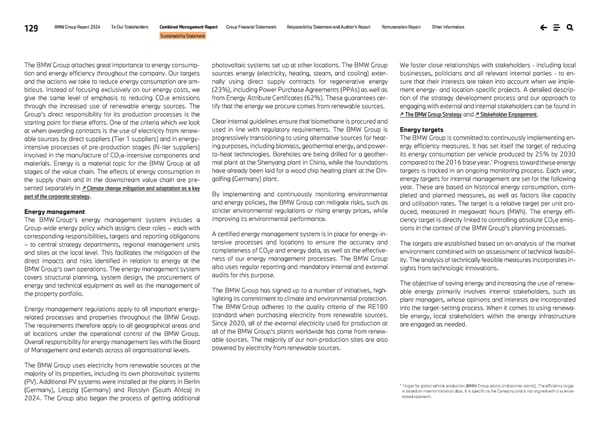129 BMW Group Report 2024 To Our Stakeholders Combined Management Report Group Financial Statements Responsibility Statement and Auditor’s Report Remuneration Report Other Information Sustainability Statement The BMW Group attaches great importance to energy consump- tion and energy efficiency throughout the company. Our targets and the actions we take to reduce energy consumption are am- bitious. Instead of focusing exclusively on our energy costs, we give the same level of emphasis to reducing CO2e emissions through the increased use of renewable energy sources. The Group’s direct responsibility for its production processes is the starting point for these efforts. One of the criteria which we look at when awarding contracts is the use of electricity from renew- able sources by direct suppliers (Tier 1 suppliers) and in energy- intensive processes of pre-production stages (N-tier suppliers) involved in the manufacture of CO2e-intensive components and materials. Energy is a material topic for the BMW Group at all stages of the value chain. The effects of energy consumption in the supply chain and in the downstream value chain are pre- sented separately in ↗ Climate change mitigation and adaptation as a key part of the corporate strategy. Energy management The BMW Group’s energy management system includes a Group-wide energy policy which assigns clear roles – each with corresponding responsibilities, targets and reporting obligations – to central strategy departments, regional management units and sites at the local level. This facilitates the mitigation of the direct impacts and risks identified in relation to energy at the BMW Group’s own operations. The energy management system covers structural planning, system design, the procurement of energy and technical equipment as well as the management of the property portfolio. Energy management regulations apply to all important energy- related processes and properties throughout the BMW Group. The requirements therefore apply to all geographical areas and all locations under the operational control of the BMW Group. Overall responsibility for energy management lies with the Board of Management and extends across all organisational levels. The BMW Group uses electricity from renewable sources at the majority of its properties, including its own photovoltaic systems (PV). Additional PV systems were installed at the plants in Berlin (Germany), Leipzig (Germany) and Rosslyn (South Africa) in 2024. The Group also began the process of getting additional photovoltaic systems set up at other locations. The BMW Group sources energy (electricity, heating, steam, and cooling) exter- nally using direct supply contracts for regenerative energy (23%), including Power Purchase Agreements (PPAs) as well as from Energy Attribute Certificates (62%). These guarantees cer- tify that the energy we procure comes from renewable sources. Clear internal guidelines ensure that biomethane is procured and used in line with regulatory requirements. The BMW Group is progressively transitioning to using alternative sources for heat- ing purposes, including biomass, geothermal energy, and power- to-heat technologies. Boreholes are being drilled for a geother- mal plant at the Shenyang plant in China, while the foundations have already been laid for a wood chip heating plant at the Din- golfing (Germany) plant. By implementing and continuously monitoring environmental and energy policies, the BMW Group can mitigate risks, such as stricter environmental regulations or rising energy prices, while improving its environmental performance. A certified energy management system is in place for energy-in- tensive processes and locations to ensure the accuracy and completeness of CO₂e and energy data, as well as the effective- ness of our energy management processes. The BMW Group also uses regular reporting and mandatory internal and external audits for this purpose. The BMW Group has signed up to a number of initiatives, high- lighting its commitment to climate and environmental protection. The BMW Group adheres to the quality criteria of the RE100 standard when purchasing electricity from renewable sources. Since 2020, all of the external electricity used for production at all of the BMW Group’s plants worldwide has come from renew- able sources. The majority of our non-production sites are also powered by electricity from renewable sources. We foster close relationships with stakeholders - including local businesses, politicians and all relevant internal parties - to en- sure that their interests are taken into account when we imple- ment energy- and location-specific projects. A detailed descrip- tion of the strategy development process and our approach to engaging with external and internal stakeholders can be found in ↗ The BMW Group Strategy and ↗ Stakeholder Engagement. Energy targets The BMW Group is committed to continuously implementing en- ergy efficiency measures. It has set itself the target of reducing its energy consumption per vehicle produced by 25% by 2030 compared to the 2016 base year.* Progress toward these energy targets is tracked in an ongoing monitoring process. Each year, energy targets for internal management are set for the following year. These are based on historical energy consumption, com- pleted and planned measures, as well as factors like capacity and utilisation rates. The target is a relative target per unit pro- duced, measured in megawatt hours (MWh). The energy effi- ciency target is directly linked to controlling absolute CO₂e emis- sions in the context of the BMW Group’s planning processes. The targets are established based on an analysis of the market environment combined with an assessment of technical feasibil- ity. The analysis of technically feasible measures incorporates in- sights from technologic innovations. The objective of saving energy and increasing the use of renew- able energy primarily involves internal stakeholders, such as plant managers, whose opinions and interests are incorporated into the target-setting process. When it comes to using renewa- ble energy, local stakeholders within the energy infrastructure are engaged as needed. * Target for global vehicle production (BMW Group plants and partner plants). The efficiency target is based on internal historical data. It is specific to the Company and is not aligned with a science- based approach.
 BMW Group Report 2024 Page 128 Page 130
BMW Group Report 2024 Page 128 Page 130